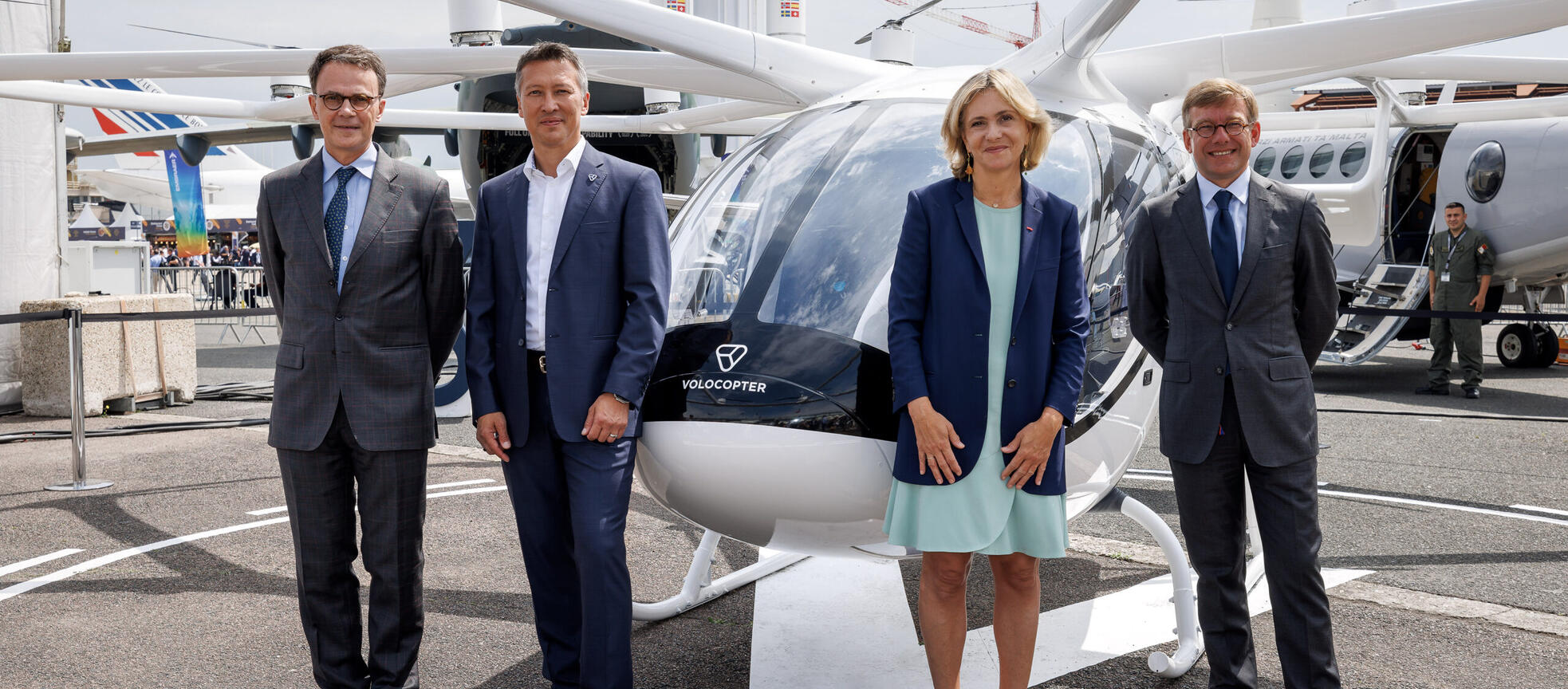EF Global VTOL
30 Jun 2023

Some lucky Parisians and Olympic Games visitors are set to become the world’s first paying passengers in an eVTOL aircraft. During last week's Paris Air Show, Volocopter confirmed it is on schedule to secure type certification by EASA for the two-seat VoloCity aircraft in time for the games, which open on July 26, 2024.
Volocopter is one of some 30 partners involved in the Re.Invent Mobility project being conducted around the Olympic Games to demonstrate the potential for new aircraft to enhance public transportation in and around the French capital. On June 22, airports group ADP, which is one of the prime movers behind the program, announced the signing of a memorandum of understanding with eVTOL developer AutoFlight under which the company will conduct flight demonstrations with its Prosperity I vehicle from a specially-constructed vertiport at Pontoise Airport, northwest of Paris.
At a Paris Air Show press conference, Edward Cartwright, director general of airports group ADP, confirmed that five aircraft will fly passengers between five vertiport sites, including two airports, Charles de Gaulle and Le Bourget (site of the Olympic media village), Saint-Cyr (near the equestrian center at Versailles), the Issy les Moulineaux helipad in the southern Paris suburbs, and a new landing site on a barge in the Seine River next to the Gare d’Austerlitz rail station. Cartwright described the process for building the Gare d'Austerlitz site as challenging, and ADP plans to award a construction contract soon.

Five Paris-area vertiports will be used for eVTOL flights during the 2024 Olympic Games, including facilities at Charles de Gaulle and Le Bourget airports, the existing heliport at Issy-les-Moulineaux, St Cyr close to Versailles, and a new-build vertiport on a barge on the Seine River next to the existing Gare d'Austerlitz train station. (Image:Volocopter)
The plan depends on Volocopter getting approval from EASA by the end of the second quarter of next year. Volocopter CEO Dirk Hoke said in July the company will start flying the 200 or so flight hours it needs to satisfy the European air safety agency and it expects to complete the process by the spring. The German manufacturer plans to apply for an air operator certificate imminently and will start flying a fixed-wing aircraft to demonstrate its competence.
Volocopter expects to have five VoloCity aircraft available to operate during the Olympic and Paralympic Games, which will run between July 26 and September 8, 2024. The company said it will likely market the limited-availability tickets for flights via its own VoloIQ app and other outlets.
If Volocopter makes its deadline for type certification, it will likely be the first Western company to meet that milestone. Rivals including Joby, Archer, Beta Technologies, Lilium, Eve, Supernal, and Vertical Aerospace are all now working to dates in 2025 and 2026 to complete this process.
In China, EHang says it will soon gain domestic approval for its two-seat EH-216 autonomous vehicle. And in another press conference on June 20, AutoFlight said it expects the Civil Aviation Administration of China to sign off on a cargo-carrying version of its Prosperity I vehicle.
Hoke acknowledged that it is by no means certain that EASA will grant approval in time for the Olympics, given that the regulator holds eVTOLs to the same safety standard as airliners, meaning they must be assured of suffering no more than one accident in a billion flights, which he said amounts to never. As a plan B, Volocopter could seek a special permit limiting operations to the duration of the games. The company already holds design and production approvals from EASA.
“If you can fly somewhere like Paris, you can fly anywhere,” Hoke said, pointing to the restrictions on helicopter flights around the French capital. He said Volocopter is excited to take the opportunity to demonstrate to the local population that eVTOL air taxis can be an affordable part of the public transportation network. Initially, flight prices will compare to an expensive taxi service, but the company aims to achieve a price of around three or four euros per seat per passenger kilometer.
The VoloCity will have a range of just 35 km (22 miles), carrying a pilot and just one passenger. Volocopter is working on a larger four-seat eVTOL vehicle now designated as the VoloRegion (but formerly referred to as VoloConnect) that would have a range of around 100 km (63 miles). Safran is helping the company to develop a new electric propulsion system for this aircraft.
AUTOFLIGHT'S PROSPERITY I EVTOL WILL FLY DEMONSTRATION MISSIONS FROM PONTOISE
According to AutoFlight, the Prosperity I eVTOL vehicle will have a much longer range of up to 250 km. Unlike the VoloCity mutlicopter, which features 18 electric motors and rotors, the Prosperity I is a lift-and-cruise design that the China-based company, which has design and engineering base in Germany, said will be far less expensive to buy than Western-made aircraft.

AutoFlight will conduct flight demonstrations of its Prosperity I eVTOL aircraft from Pontoise Airport near Paris. (Image: AutoFlight)
"Through conducting experimental piloted flights from the Pontoise vertiport, [which is] best-in-class infrastructure operated by Groupe ADP, we aim to showcase the immense potential of advanced air mobility," commented Mark Henning, managing director of AutoFlight Europe. Our 250-km-range eVTOLs will operate in real-world conditions, highlighting their capabilities in urban environments and their invaluable contribution to sustainable logistics and mobility. The 2024 Paris Olympic and Paralympic Games will be a global celebration and we take pride in AutoFlight's technology being part of it."